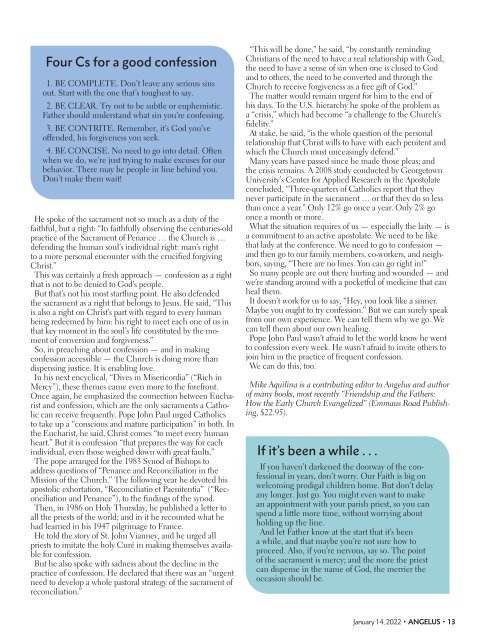Angelus News | January 14, 2022 | Vol. 7 No. 1
On the cover: It can be described as the sacrament of “penance,” “reconciliation,” or more simply, just “confession.” A necessary part of any serious Catholic’s spiritual life, certainly, but can it be something more? On Page 10, Mike Aquilina invokes the life and example of St. Pope John Paul II to make the case that confession is much more than a duty, but actually a right — and perhaps our best shot at the radical conversion God wants to give us.
On the cover: It can be described as the sacrament of “penance,” “reconciliation,” or more simply, just “confession.” A necessary part of any serious Catholic’s spiritual life, certainly, but can it be something more? On Page 10, Mike Aquilina invokes the life and example of St. Pope John Paul II to make the case that confession is much more than a duty, but actually a right — and perhaps our best shot at the radical conversion God wants to give us.
Create successful ePaper yourself
Turn your PDF publications into a flip-book with our unique Google optimized e-Paper software.
Four Cs for a good confession<br />
1. BE COMPLETE. Don’t leave any serious sins<br />
out. Start with the one that’s toughest to say.<br />
2. BE CLEAR. Try not to be subtle or euphemistic.<br />
Father should understand what sin you’re confessing.<br />
3. BE CONTRITE. Remember, it’s God you’ve<br />
offended, his forgiveness you seek.<br />
4. BE CONCISE. <strong>No</strong> need to go into detail. Often<br />
when we do, we’re just trying to make excuses for our<br />
behavior. There may be people in line behind you.<br />
Don’t make them wait!<br />
He spoke of the sacrament not so much as a duty of the<br />
faithful, but a right: “In faithfully observing the centuries-old<br />
practice of the Sacrament of Penance … the Church is …<br />
defending the human soul’s individual right: man’s right<br />
to a more personal encounter with the crucified forgiving<br />
Christ.”<br />
This was certainly a fresh approach — confession as a right<br />
that is not to be denied to God’s people.<br />
But that’s not his most startling point. He also defended<br />
the sacrament as a right that belongs to Jesus. He said, “This<br />
is also a right on Christ’s part with regard to every human<br />
being redeemed by him: his right to meet each one of us in<br />
that key moment in the soul’s life constituted by the moment<br />
of conversion and forgiveness.”<br />
So, in preaching about confession — and in making<br />
confession accessible — the Church is doing more than<br />
dispensing justice. It is enabling love.<br />
In his next encyclical, “Dives in Misericordia” (“Rich in<br />
Mercy”), these themes came even more to the forefront.<br />
Once again, he emphasized the connection between Eucharist<br />
and confession, which are the only sacraments a Catholic<br />
can receive frequently. Pope John Paul urged Catholics<br />
to take up a “conscious and mature participation” in both. In<br />
the Eucharist, he said, Christ comes “to meet every human<br />
heart.” But it is confession “that prepares the way for each<br />
individual, even those weighed down with great faults.”<br />
The pope arranged for the 1983 Synod of Bishops to<br />
address questions of “Penance and Reconciliation in the<br />
Mission of the Church.” The following year he devoted his<br />
apostolic exhortation, “Reconciliatio et Paenitentia” (“Reconciliation<br />
and Penance”), to the findings of the synod.<br />
Then, in 1986 on Holy Thursday, he published a letter to<br />
all the priests of the world; and in it he recounted what he<br />
had learned in his 1947 pilgrimage to France.<br />
He told the story of St. John Vianney, and he urged all<br />
priests to imitate the holy Curé in making themselves available<br />
for confession.<br />
But he also spoke with sadness about the decline in the<br />
practice of confession. He declared that there was an “urgent<br />
need to develop a whole pastoral strategy of the sacrament of<br />
reconciliation.”<br />
“This will be done,” he said, “by constantly reminding<br />
Christians of the need to have a real relationship with God,<br />
the need to have a sense of sin when one is closed to God<br />
and to others, the need to be converted and through the<br />
Church to receive forgiveness as a free gift of God.”<br />
The matter would remain urgent for him to the end of<br />
his days. To the U.S. hierarchy he spoke of the problem as<br />
a “crisis,” which had become “a challenge to the Church’s<br />
fidelity.”<br />
At stake, he said, “is the whole question of the personal<br />
relationship that Christ wills to have with each penitent and<br />
which the Church must unceasingly defend.”<br />
Many years have passed since he made those pleas; and<br />
the crisis remains. A 2008 study conducted by Georgetown<br />
University’s Center for Applied Research in the Apostolate<br />
concluded, “Three-quarters of Catholics report that they<br />
never participate in the sacrament … or that they do so less<br />
than once a year.” Only 12% go once a year. Only 2% go<br />
once a month or more.<br />
What the situation requires of us — especially the laity — is<br />
a commitment to an active apostolate. We need to be like<br />
that lady at the conference. We need to go to confession —<br />
and then go to our family members, co-workers, and neighbors,<br />
saying, “There are no lines. You can go right in!”<br />
So many people are out there hurting and wounded — and<br />
we’re standing around with a pocketful of medicine that can<br />
heal them.<br />
It doesn’t work for us to say, “Hey, you look like a sinner.<br />
Maybe you ought to try confession.” But we can surely speak<br />
from our own experience. We can tell them why we go. We<br />
can tell them about our own healing.<br />
Pope John Paul wasn’t afraid to let the world know he went<br />
to confession every week. He wasn’t afraid to invite others to<br />
join him in the practice of frequent confession.<br />
We can do this, too.<br />
Mike Aquilina is a contributing editor to <strong>Angelus</strong> and author<br />
of many books, most recently “Friendship and the Fathers:<br />
How the Early Church Evangelized” (Emmaus Road Publishing,<br />
$22.95).<br />
If it’s been a while . . .<br />
If you haven’t darkened the doorway of the confessional<br />
in years, don’t worry. Our Faith is big on<br />
welcoming prodigal children home. But don’t delay<br />
any longer. Just go. You might even want to make<br />
an appointment with your parish priest, so you can<br />
spend a little more time, without worrying about<br />
holding up the line.<br />
And let Father know at the start that it’s been<br />
a while, and that maybe you’re not sure how to<br />
proceed. Also, if you’re nervous, say so. The point<br />
of the sacrament is mercy; and the more the priest<br />
can dispense in the name of God, the merrier the<br />
occasion should be.<br />
<strong>January</strong> <strong>14</strong>, <strong>2022</strong> • ANGELUS • 13


















